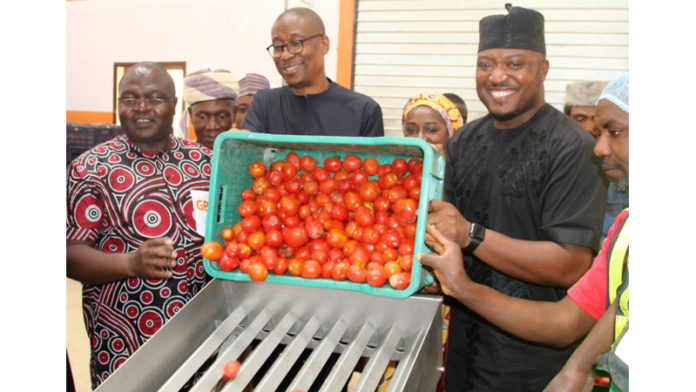The Minister of Industry, Trade and Investment, Dr. Okechukwu Enelamah has assured tomato producers in the country that government is committed to boosting tomato production in line with on-going economic diversification efforts.hh
He said the Federal Government has a robust tomato policy to boost local production, stop importation of tomato paste, and create employment opportunities.
The Minister disclosed this during a facility visit to GB Foods Nigeria’s tomato backward integration project in Kaduna, Kaduna State. In addition to its own farm, the company is implementing an outgrowers programme to develop local farmers
Gino Tomato backward integration project operates on the tomato production value chain from seedling growing, planting, harvesting and production of tomato paste on the farm.
The Federal Government’s tomato policy, according to the Minister, is to significantly reduce post–harvest losses of tomato fruits, boost production and attract investments into the entire value chain.
The Minister said the implementation of the policy would also open investment in green house farming and address some challenges faced by tomato farmers in the country.
He described the visit as a useful one and that what he saw reinforced his belief that big things can be done in the country.
“I like what I saw and I am highly impressed,” he said.
The Minister applauded the support of the Kaduna State government to the company and assured that the implementation of a tomato policy is fashioned to encourage everyone in the industry.
Stressing that it is very important that the industry succeeds, he advised the company to approach the business with zeal, commitment and hands-on attitude.
“When we see genuine investors, ours is to help them grow,” the minister said.
The Chairman of GB Food Africa, Alhaji Francis Ogboro, commended the Minister for visiting the farm despite his busy schedule, assuring him that Gino Tomato Farm will contribute its quota towards the growth of the industry in the country.
Alhaji Ogboro told the Minister that the company has so far spent over N2 billion on the backward integration project on the farm in the procurement of tractors, high tech farming equipment for seedling, planting, harvesting and processing of the tomato paste among others. The project also consists of four hectares of Greenhouse seedlings; 16 hectares of tomato planted, all of which have created over 50 jobs.
He said, GBFoods Africa’s investments in Nigeria will make a significant positive socio and economic impact, including: the creation of 1,500 jobs, empowerment of more than 3,000 farmers; reduction of foreign currency demand; increased tax revenue; increased productivity of the tomato industry by a minimum of 60MT/Ha; and reduced food imports.
“Additionally, there will be capacity building and knowledge transfer to Nigerians,” he said.
The Chairman solicited the support and cooperation of the Federal and Kaduna State governments, especially incentives, for the growth of the tomato industry.
Ibrahim Haruna
DD Press and Head, PPRU






